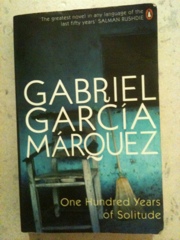R: Nobel Prize winner and general giant of world literature, this was my first encounter with Gabriel Garcia Marquez. This book, certainly his most famous, focuses on the events surrounding one family in Macondo, a fictitious town in Columbia, as the Buendias battle sickness, war and natural disasters.
I’ve heard a few times from fellow bibliophiles that one sticking point of the book is not simply the number of characters involved but the repetitiveness or similarity of the names. It is with no exaggeration when I say that there is a Jose Arcadio Buendia, an Aureliano Buendia (who later becomes Colonel to make things a bit easier), a Jose Arcadio, an Aureliano Jose, an Aureliano Segundo, a Jose Arcadio Segundo, another Aureliano, another Jose Arcadio, yet another Aureliano, and seventeen other Aurelianos thrown in for good measure.
I can’t pretend that my reading was entirely free from confusion – there was a fair bit of flicking back and forth to remind myself of the latest Aureliano or Jose – but I did find that things settled down from midway through the book.
Much has been written about Marquez’s magical realism style, and I won’t attempt to add anything worthwhile to the debate, but in ‘One Hundred Years’ the number of ideas he generates and the richness of the world he creates is at times staggering. The text is so dense and dripping with apparent meaning that it is at times difficult to absorb.
I felt that although I missed a good proportion of the novel’s intent I still came away with an overall feeling that, locked away in the thickness of the text, the book held important truths about life. The most obvious ones being that the human condition is ultimately one of loneliness and decay; that the true nature of things is characterised by solitude and entropy.
Despite the ostensibly depressing themes, I still can’t quite make up my mind if ‘One Hundred Years’ is a sad or a happy story. And it is perhaps for this reason more than any other that the story of the Buendia family succeeds as a metaphor for life.

